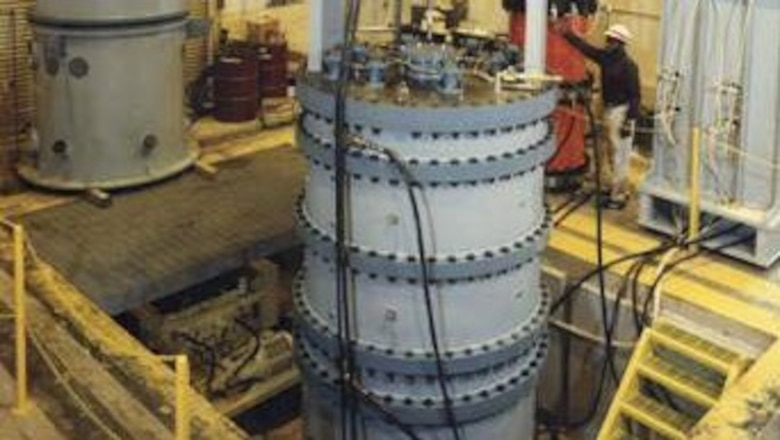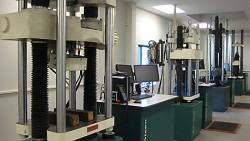Accuracy Perfected: Materials Test Lab Insights for Success
Wiki Article
Putting Materials to the Test: Checking Out the Duty of Products Examination Labs
Products test laboratories play a critical function in ensuring the top quality and dependability of various materials made use of in markets such as aerospace, building, and production. Through a mix of advanced methods and customized equipment, products examination labs are able to evaluate the properties of steels, polymers, composites, and other materials under various conditions and stress factors. This article will certainly explore the significance of materials screening, the kinds of materials checked, screening strategies and equipment utilized, as well as the applications of products examination results.Importance of Materials Screening
On a regular basis examining the high quality of materials is essential in ensuring the honesty and security of items in different industries. Products screening involves subjecting products to different examinations and experiments to review their mechanical, physical, and chemical residential or commercial properties.One of the key reasons products testing is very important is the assurance of product top quality. With rigorous screening, producers can recognize any type of flaws or weak points in the materials utilized for their products. This enables them to make necessary enhancements to enhance the overall top quality and performance of their items. Materials screening aids in determining possible problems that might arise during the item's lifecycle, such as wear and tear, deterioration, or structural failings. By addressing these problems at an early stage, suppliers can avoid expensive recalls, lawsuits, and reputational damage.
Furthermore, materials testing is crucial for ensuring the security of items - materials test lab. By subjecting materials to various tests, makers can establish their resistance, stamina, and toughness to exterior elements such as warm, pressure, or chemicals. This info is vital in creating and making items that are risk-free for consumers to make use of. Whether it is auto parts, clinical gadgets, or building materials, materials testing helps in determining any type of potential safety hazards and developing ideal actions to minimize them.
Sorts Of Products Evaluated
Numerous types of products are evaluated in materials examination labs to review their mechanical, physical, and chemical properties. These products can encompass a variety of compounds, consisting of metals, polymers, ceramics, compounds, and even natural products such as wood and concrete.Metals are commonly examined because of their prevalent use in different sectors. These tests examine properties such as tensile stamina, firmness, and ductility. Polymers, on the various other hand, are tested to identify their flexibility, thermal stability, and resistance to chemicals. Ceramics are taken a look at for their resistance, toughness, and brittleness to high temperatures. Composites, which contain 2 or even more different materials, are assessed to recognize their overall performance, including aspects like toughness, versatility, and durability.
Natural materials like timber are checked to evaluate their strength, moisture web content, and resistance to decay (materials test lab). Concrete is an additional generally checked material, with examinations focusing on its compressive stamina, toughness, and resistance to environmental variables
In enhancement to these materials, products test laboratories also review coverings, paints, adhesives, and different other materials used in building, manufacturing, and various other industries. By subjecting these materials to rigorous screening, engineers and scientists can collect useful information to inform product option, style optimization, and top quality control processes.
Testing Methods and Tools
Evaluating techniques and devices play an important duty in materials test laboratories for evaluating the mechanical, physical, and chemical properties of different materials. These methods and tools are important in making certain the quality, dependability, and safety and security of products used in different industries such as aerospace, automobile, building and construction, and clinical.One commonly utilized screening strategy in products examination labs is mechanical screening, which entails subjecting products to various forces or loads to identify their stamina, solidity, ductility, and other mechanical homes. This is usually done making use of equipment such as universal testing machines, which can apply tensile, compressive, and bending forces to check samplings.
Physical screening strategies are additionally used to analyze properties such as density, viscosity, thermal conductivity, and electric conductivity. Tools such as thickness meters, viscometers, thermal conductivity analyzers, and electric conductivity meters are used to execute these tests properly.
Chemical testing techniques are utilized to figure out the chemical structure and purity of materials. Techniques such as spectroscopy, chromatography, and mass spectrometry are commonly utilized, in addition to customized tools created for these functions.

Applications of Materials Test Results
The results of materials evaluating supply beneficial understandings right into the efficiency and viability of various products for certain applications in numerous sectors - materials test lab. These examination results play a crucial role in determining the quality, toughness, and safety of materials made use of in making proceduresAmong the crucial applications of products test results is in the field of building. Architects and engineers review rely upon these outcomes to select suitable materials for building frameworks, such as bridges, high-rises, and household structures. By carrying out examinations on products like concrete, steel, and wood, they can make sure that these materials fulfill the needed requirements and can withstand numerous ecological conditions.
In the aerospace sector, products test outcomes are necessary in determining the viability of materials for airplane elements. By subjecting materials to strenuous testing, designers can examine their mechanical residential properties, resistance to heat and rust, and ability to hold up against high-stress conditions. This details is important in guaranteeing the safety and security and dependability of airplane.

Future Trends in Products Testing
In the world of materials screening, developments in products evaluating methodologies are forming the trajectory of the area, ushering in a brand-new age of innovation and precision. As innovation proceeds to evolve, so does the demand for more innovative testing strategies and equipment. One future pattern in products testing is the combination of synthetic knowledge (AI) and device understanding algorithms right into screening processes. These innovations have the possible to improve the effectiveness and precision of examination results by examining huge amounts of data and determining patterns that might not be easily noticeable by people. In addition, using check my site non-destructive screening approaches is coming to be increasingly prominent. These techniques enable the evaluation of material buildings without causing damage or modification to the example, making them excellent for testing irreplaceable or important materials. There is a growing focus on sustainability in materials testing. This includes the development of testing methods that reduce waste and power consumption, as well as making use of environmentally-friendly products in screening tools. Overall, the future of products screening is identified by continual technology and a dedication to boosting performance, sustainability, and precision.Conclusion
To conclude, products screening plays an essential function in different industries by making certain the quality, safety and security, and efficiency of products used in structures and products. It involves checking a variety of products utilizing various techniques and devices to review their mechanical, physical, and chemical residential properties. The results gotten from products screening are used to make informed decisions in product design, selection, and production procedures. As technology breakthroughs, materials evaluating laboratories will certainly proceed to adapt and improve their approaches to fulfill the developing demands of markets.With a combination of sophisticated browse this site techniques and specialized equipment, materials examination laboratories are able to analyze the residential or commercial properties of metals, polymers, compounds, and various other products under different conditions and stressors. By conducting examinations on products like concrete, wood, and steel, they can make certain that these products satisfy the required criteria and can hold up against different environmental conditions.
In the aerospace sector, materials test outcomes are necessary in identifying the viability of products for airplane elements. By testing products for their flexibility, toughness, and resistance to impact, suppliers can choose the most ideal materials for various automobile parts, such as body panels, engine parts, and safety functions.In the realm of materials screening, improvements in materials checking methodologies are forming the trajectory of the field, ushering in a brand-new age of technology and precision.
Report this wiki page